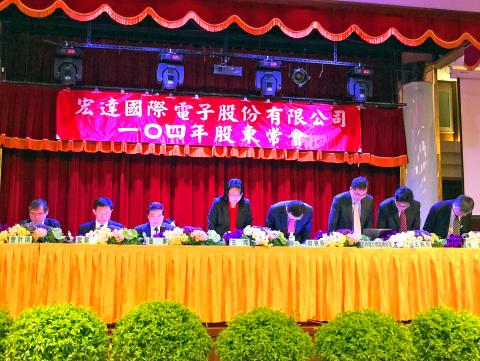HTC chairwoman and chief executive officer Cher Wang (王雪紅) yesterday apologized to shareholders for the company’s disappointing performance over the past few months.
Wang said HTC’s performance was mainly due to its poor operational efficiency and overly conservative marketing strategy amid fierce competition in the global market.
“HTC’s recent performance has let people down,” Wang said at the company’s annual general meeting.

Photo: CNA
Wang’s apology came a day after HTC’s stock price dropped below NT$100 to a 12-year low of NT$98. Shares stood as high as NT$1,300 on April 1, 2011.
This year’s HTC flagship One M9 smartphone, which was launched in April, was criticized for lacking differentiation from its previous model, the One M8. The smartphone also encountered thermal issues causing shipment delays after its sales launch.
In an effort to improve the company’s smartphone segment, HTC’s core business, Wang said the company plans to launch a “hero product” in October, and make significant improvements in innovation and design for the next flagship model next year.
The company is also planning to improve its product mix strategy for smartphones, she added.
Wang said HTC would reduce its production costs by improving production efficiency as well as optimizing its components supply chain, adding that it would also outsource some orders to increase operational flexibility.
Saying that the marketing budgets of Apple Inc and Samsung Electronics Co are 20 times higher than HTC’s, Wang said the firm must improve its marketing strategies.
Chief financial officer Chang Chia-lin (張嘉臨) said that HTC increased research and development investment by 4 percent annually to NT$13 billion (US$419.33 million) last year, while its marketing expenses dropped 19.26 percent to NT$26 billion from a year ago.
HTC does not sell well using conventional marketing strategies, Wang said, adding that it would not renew US actor Robert Downey Jr’s contract after this year, but that it would keep working with the popular Taiwanese rock group Mayday (五月天).
In an attempt to develop new business, HTC would develop virtual reality applications, such as the HTC Vive virtual reality headset that it developed with US-based game developer Valve, Wang said.
Wang said that the HTC Vive, which was unveiled at the annual World Mobile Congress in Barcelona in March, has been well-received by the market and that the company would focus on virtual reality development.
“I am upbeat about HTC’s outlook. We aim to focus on developing the right products,” Wang said.
The company has not announced a launch date for the Vive.
At an investors’ conference in February, Chang said that HTC hopes the non-smartphone segment can contribute at least 10 percent of the firm’s total revenues next year.
HTC’s shares closed up 0.51 percent at NT$98.5 in Taipei trading yesterday, while the TAIEX lost 0.12 percent.

RECYCLE: Taiwan would aid manufacturers in refining rare earths from discarded appliances, which would fit the nation’s circular economy goals, minister Kung said Taiwan would work with the US and Japan on a proposed cooperation initiative in response to Beijing’s newly announced rare earth export curbs, Minister of Economic Affairs Kung Ming-hsin (龔明鑫) said yesterday. China last week announced new restrictions requiring companies to obtain export licenses if their products contain more than 0.1 percent of Chinese-origin rare earths by value. US Secretary of the Treasury Scott Bessent on Wednesday responded by saying that Beijing was “unreliable” in its rare earths exports, adding that the US would “neither be commanded, nor controlled” by China, several media outlets reported. Japanese Minister of Finance Katsunobu Kato yesterday also

Taiwan’s rapidly aging population is fueling a sharp increase in homes occupied solely by elderly people, a trend that is reshaping the nation’s housing market and social fabric, real-estate brokers said yesterday. About 850,000 residences were occupied by elderly people in the first quarter, including 655,000 that housed only one resident, the Ministry of the Interior said. The figures have nearly doubled from a decade earlier, Great Home Realty Co (大家房屋) said, as people aged 65 and older now make up 20.8 percent of the population. “The so-called silver tsunami represents more than just a demographic shift — it could fundamentally redefine the

China Airlines Ltd (CAL, 中華航空) said it expects peak season effects in the fourth quarter to continue to boost demand for passenger flights and cargo services, after reporting its second-highest-ever September sales on Monday. The carrier said it posted NT$15.88 billion (US$517 million) in consolidated sales last month, trailing only September last year’s NT$16.01 billion. Last month, CAL generated NT$8.77 billion from its passenger flights and NT$5.37 billion from cargo services, it said. In the first nine months of this year, the carrier posted NT$154.93 billion in cumulative sales, up 2.62 percent from a year earlier, marking the second-highest level for the January-September

‘DRAMATIC AND POSITIVE’: AI growth would be better than it previously forecast and would stay robust even if the Chinese market became inaccessible for customers, it said Taiwan Semiconductor Manufacturing Co (TSMC, 台積電) yesterday raised its full-year revenue growth outlook after posting record profit for last quarter, despite growing market concern about an artificial intelligence (AI) bubble. The company said it expects revenue to expand about 35 percent year-on-year, driven mainly by faster-than-expected demand for leading-edge chips for AI applications. The world’s biggest contract chipmaker in July projected that revenue this year would expand about 30 percent in US dollar terms. The company also slightly hiked its capital expenditure for this year to US$40 billion to US$42 billion, compared with US$38 billion to US$42 billion it set previously. “AI demand actually